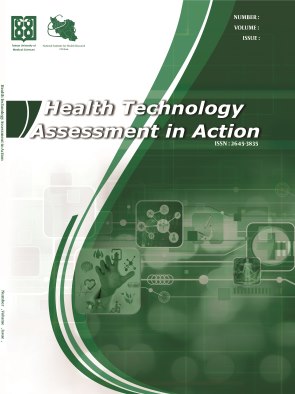Future of Health Technology Assessment System in Iran: Necessity of reinforcement in both scenarios of sanction’s continuation and its lifting
Abstract
Background: In Iran, health technology assessment (HTA) system dates back to nearly a decades ago (2008).
Objectives: The current study aimed to define steps required to expand HTA in Iran by emphasizing possible future events related to the health sector.
Methods: A preliminary list of future trends potentially influencing Iran’s HTA system was extracted through the literature review. Then, the trends were presented to 12 experts to obtain their opinions. Afterward, their influence on the future of the HTA system in Iran was investigated using in-depth interviews. The interviews were analyzed using the thematic analysis method; Initially, in three categories of capacity building, provision of HTA, and supportive mechanisms, and then according to the essential functions of a health system (i.e.,control knobs).
Results: Interviewees believed that strengthening the HTA system is mandatory, regardless of future political events. In the category of capacity building, adjusting training to the needs, using the capacity of graduates in conducting HTAs, training more students in the HTA profession as well as the establishment of a Ph.D. program, turning HTA into public demand, and preventing overuse of medical technologies were elaborated. In the second category (i.e., provision of HTA), the following themes were extracted: modernization and equipping of health system infrastructure based on the evidence provided by HTA, the legitimization of HTA to be used for all health technologies, preventing the introduction of unnecessary technologies and similar technologies that are currently using in Iran, and employing HTA in developing the basic benefit package.
Conclusions: Due to international sanctions, Iran has a niche healthcare market. If sanctions continue, HTA would be a serious necessity to increase the resilience of the health system. In the case of sanctions relief, HTA is still necessary for the optimization of allocating resources. These steps, in both scenarios, are mostly related to the institutionalization of HTA, mostly on the legitimization of HTA and behavioral changes.
2. Olyaeemanesh A, Doaee S, Mobinizadeh M, Nedjati M, Aboee P, Emami-Razavi SH. Health technology assessment in Iran: challenges and views. Med J Islam Repub Iran. 2014;28:157. [PubMed:25695015].
3. Baradaran-Seyed Z, Majdzadeh R. Evidence-based health care, past deeds at a glance, challenges and the future prospects in iran. Iran J Public Health. 2012;41(12):1-7. [PubMed:23641384].
4. Agency IRN. Islamic Republic News Agency 2017. Available from: http://www.irna.org/fa/News/82426324/.
5. Danaei G, Harirchi I, Sajadi HS, Yahyaei F, Majdzadeh R. The harsh effects of sanctions on Iranian health. Lancet.
2019;394(10197):468-9. doi:10.1016/s0140-6736(19)31763-5.
6. Doaee S, Olyaeemanesh A, Emami S, Mobinizadeh M, Abooee P, Nejati M, et al. Development and implementation of health technology assessment: a policy study. Iran J Public Health. 2013;42(Supple 1):50-4.
7. Ministry of Health And Medical Education. General Health Policies endorsed by supreme leader 2015; Available from: http://ird. behdasht.gov.ir/index.aspx?siteid=419&pageid=51060&newsvi ew=106249.
8. Mohtasham F, Yazdizadeh B, Zali Z, Majdzadeh R, Nedjat S. Health technology assessment in Iran: Barriers and solutions. Med J Islam Repub Iran. 2016;30(1):77-84.
9. Bidgoli SJ, Sarrafkia A, Poor MM, Mohammadimoghadam Y. Future study and Strategic Management and their relationship with the Iran’s 2025 Perspective Document. Int J Humani Cult Stud. 2016(2356-5926):708-22.
10. Kaló Z, Gheorghe A, Huic M, Csanádi M, Kristensen FB. HTA implementation roadmap in Central and Eastern European Countries.Health Econ. 2016;25:179-92. doi:10.1002/hec.3298.
11. Rosselli D, Quirland-Lazo C, Csanádi M, Ruiz de Castilla EM, González NC, Valdés J, et al. HTA Implementation in Latin American Countries: Comparison of Current and Preferred Status. Value Health Reg Issues. 2017;14:20-7. doi:10.1016/j.vhri.2017.02.004.
12. Roberts M, Hsiao W, Peter Berman P, Reich M. Getting health reform right : A guide to improving performance and equity. 2008.
13. Roberts MJ. Defining and solving problems using the “control knob” Wiseman seminar. Sep2004. Tehran; 2004.
14. Banta D, Almeida RT. The development of health technology assessment in Brazil. Int J Technol Assess Health Care. 2009;25(S1):255-9. doi:10.1017/s0266462309090722.
15. Kahveci R, Koç EM, Küçük EÖ. Health technology assessment in turkey. Int J Technol Assess Health Care. 2017;33(3):402-8. doi:10.1017/s0266462317000289. [PubMed:28595660].
16. Stevens A, Milne R. Health technology assessment in england and wales. Int J Technol Assess Health Care. 2004;20(1):11-24. doi:10.1017/s0266462304000741.
17. Hisashige A. History of healthcare technology assessment in Japan. Int J Technol Assess Health Care. 2009;25(S1):210-8. doi:10.1017/ s0266462309090655.
18. Koch P, Schilling J, Läubli M, Mitscherlich F, Melchart D, Bellucci S. Health technology assessment in Switzerland. Int J Technol Assess Health Care. 2009;25(S1):174-7. doi:10.1017/s0266462309090606.
| Files | ||
| Issue | Vol 4, No 2 (2020) | |
| Section | Articles | |
| DOI | https://doi.org/10.18502/htaa.v4i2.6227 | |
| Keywords | ||
| HTA sanction Iran | ||
| Rights and permissions | |

|
This work is licensed under a Creative Commons Attribution-NonCommercial 4.0 International License. |




